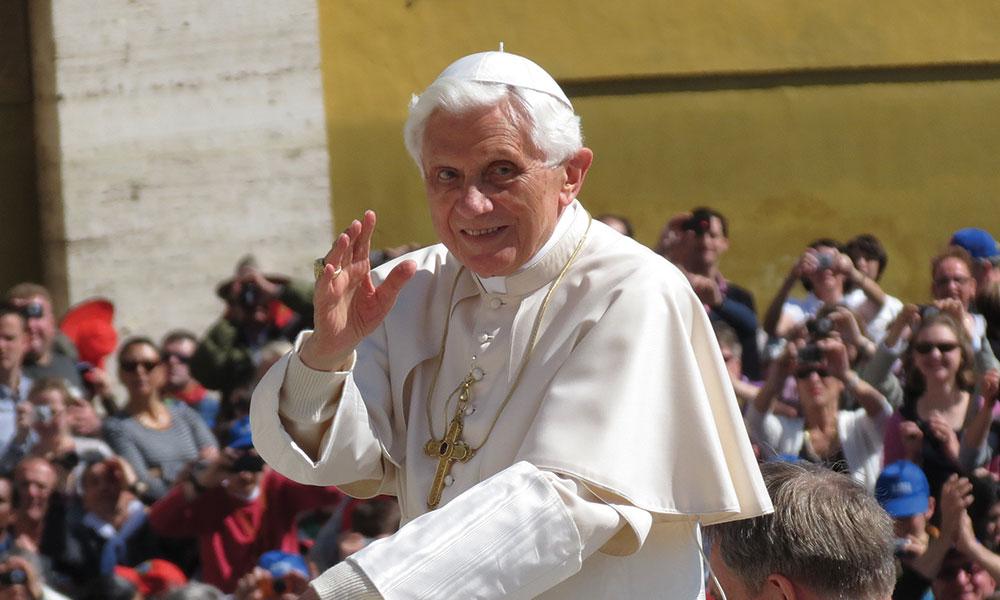
Pope Emeritus Benedict XVI on the Meaning of Charity
In 2009, then-Pope Benedict XVI signed his third and final encyclical, entitled “Caritas in Veritate,” or “Charity in Truth.” While the encyclical tackled an array of important social and economic issues, the pope also shared his thoughts on giving.
The impact of the pope’s intercession was immense. His words helped increase generosity across the globe, impacted discussions at the 2009 G8 Summit in Italy, and prompted key business and economic leaders of all faiths to consider the impact of their contributions. But it is the words of his introduction that tell us most about how we, as Catholics, can live lives that are rich in both charity and truth. These words are excerpted in part here:
Charity in truth, to which Jesus Christ bore witness by his earthly life and especially by his death and resurrection, is the principal driving force behind the authentic development of every person and of all humanity. Love — caritas — is an extraordinary force which leads people to opt for courageous and generous engagement in the field of justice and peace. It is a force that has its origin in God, Eternal Love and Absolute Truth…
…Charity is at the heart of the Church's social doctrine. Every responsibility and every commitment spelt out by that doctrine is derived from charity which, according to the teaching of Jesus, is the synthesis of the entire Law (cf. Mt 22:36- 40). It gives real substance to the personal relationship with God and with neighbor; it is the principle not only of micro-relationships (with friends, with family members or within small groups) but also of macro-relationships (social, economic and political ones). For the Church, instructed by the Gospel, charity is everything because, as Saint John teaches (cf. 1 Jn 4:8, 16) and as I recalled in my first Encyclical Letter, “God is love” (Deus Caritas Est): everything has its origin in God's love, everything is shaped by it, everything is directed towards it.
Love is God's greatest gift to humanity, it is his promise and our hope.
I am aware of the ways in which charity has been and continues to be misconstrued and emptied of meaning, with the consequent risk of being misinterpreted, detached from ethical living and, in any event, undervalued. In the social, juridical, cultural, political and economic fields — the contexts, in other words, that are most exposed to this danger — it is easily dismissed as irrelevant for interpreting and giving direction to moral responsibility. Hence the need to link charity with truth not only in the sequence, pointed out by Saint Paul, of veritas in caritate (Eph 4:15), but also in the inverse and complementary sequence of caritas in veritate. Truth needs to be sought, found and expressed within the “economy” of charity, but charity in its turn needs to be understood, confirmed and practiced in the light of truth. In this way, not only do we do a service to charity enlightened by truth, but we also help give credibility to truth, demonstrating its persuasive and authenticating power in the practical setting of social living. This is a matter of no small account today, in a social and cultural context which relativizes truth, often paying little heed to it and showing increasing reluctance to acknowledge its existence.
Through this close link with truth, charity can be recognized as an authentic expression of humanity and as an element of fundamental importance in human relations, including those of a public nature. Only in truth does charity shine forth, only in truth can charity be authentically lived. Truth is the light that gives meaning and value to charity…
… Charity is love received and given. It is “grace” (cháris). Its source is the wellspring of the Father's love for the Son, in the Holy Spirit. Love comes down to us from the Son. It is creative love, through which we have our being; it is redemptive love, through which we are recreated. Love is revealed and made present by Christ (cf. Jn 13:1) and “poured into our hearts through the Holy Spirit” (Rom 5:5). As the objects of God's love, men and women become subjects of charity, they are called to make themselves instruments of grace, so as to pour forth God's charity and to weave networks of charity.
As we remember the life of Pope Emeritus Benedict XVI, let us pour forth God’s charity and truth together, as we give with open hands and hearts to a world that is greatly in need of both.



